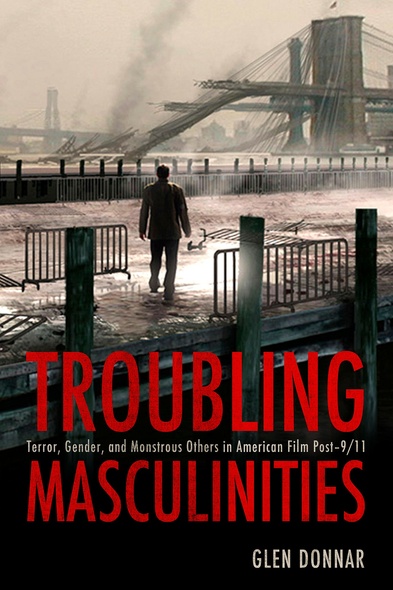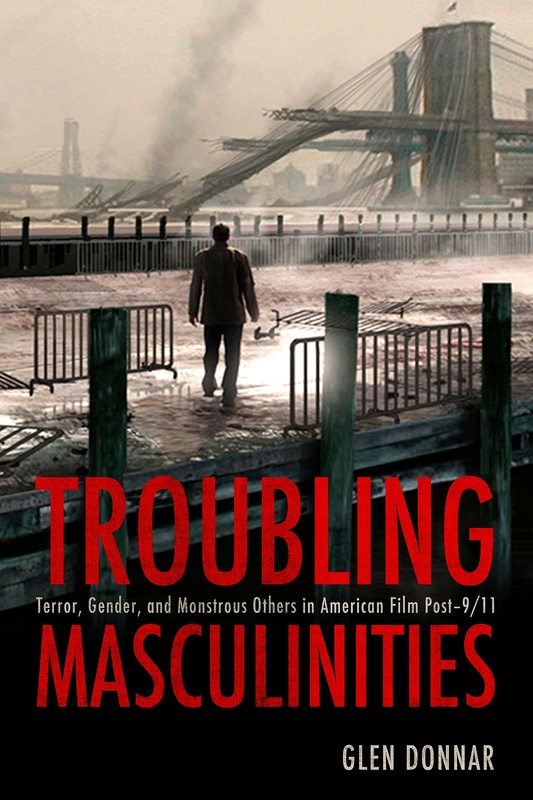
Troubling Masculinities
Terror, Gender, and Monstrous Others in American Film Post-9/11
Troubling Masculinities: Terror, Gender, and Monstrous Others in American Film Post-9/11 is the first multigenre study of representations of masculinity following the emergence of violent terror as a plot element in American cinema after September 11, 2001. Across a broad range of subgenres—including disaster melodrama, monster movies, postapocalyptic science fiction, discovered footage and home invasion horror, action-thrillers, and frontier westerns—author Glen Donnar examines the impact of “terror-Others,” from Arab terrorists to giant monsters, especially in relation to cinematic representations in earlier periods of national turmoil.
Donnar demonstrates that the reassertion of masculinity and American national identity in post-9/11 cinema repeatedly unravels across genres. Taking up critical arguments about Hollywood’s attempts to resolve male crisis through Orientalizing figures of terror, he shows how this failure reflects an inability to effectively extinguish the threat or frightening difference of terror. The heroes in these movies are unable to heal themselves or restore order, often becoming as destructive as the threats they are supposed to be fighting.
Donnar concludes that interrelated anxieties about masculinity and nationhood continue to affect contemporary American cinema and politics. By showing how persistent these cultural fears are, the volume offers an important counternarrative to this supposedly unprecedented moment in American history.
What is not uncertain. . . is the author’s success in challenging the reader to hereafter interpret this often-encountered cinematic genre in an entirely new light.
Donnar’s book is a meticulous examination of masculinity in Hollywood genre films during a specific period of time and adds great value to the discourse surrounding masculinity in contemporary culture. It challenges the conventional wisdom surrounding films that have received significant scholarly contention and persuasively argues that the films are more complex than they appear.
Troubling Masculinities serves as an introduction to how fictional audiovisual narratives create and respond to ideals of hegemonic masculinity, as well as how cinema represents masculinities in a time of prolonged crisis. The ‘incoherent' disaster of 9/11 and how the entertainment industry responded to it and tried to construct narratives around it is particularly pertinent in our current era of the COVID-19 pandemic.
All in all, Troubling Masculinities: Terror, Gender, and Monstrous Others in American Film Post-9/11 offers a very detailed and reader-friendly study of ideologies of normative masculinity in film as the shock of the September 11th attacks continues to resonate today both socially and politically. In focusing on a concentrated period of time during the mid-to-late 2000s, Glen Donnar places his finger on the pulse of a very formative period of cinematic and cultural activity that remains an indelible part of American cinematic history.
Combining superb close textual analysis and wider historical and cultural contextualization, Troubling Masculinities explores the way masculinity, national identity, and monstrosity are used to resurrect America and preserve patriarchy, even as they are seen to wither and unravel. Analyzing such diverse films as World Trade Center, Cloverfield, The Strangers, I Am Legend, and The Kingdom, this book is a must-have addition to the literature on 9/11 cinema.
Glen Donnar is senior lecturer in the School of Media and Communication at RMIT University. His work has appeared in such publications as Senses of Cinema, Journal of Popular Culture, and Celebrity Studies.





